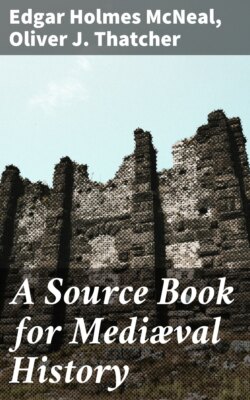Читать книгу A Source Book for Mediæval History - Oliver J. Thatcher - Страница 52
На сайте Литреса книга снята с продажи.
33. Legislation Concerning the Election of Bishops, Fourth to the Ninth Century.
ОглавлениеTable of Contents
Corpus Juris Canonici. Dist. LXIII, c. vi, vii, and i.
In the election of the clergy, especially of the bishops, it was some centuries before the theory and the practice of the church entirely agreed. In theory the laity should have nothing to do with the election of the clergy, but in fact, they have, at various times and in different degrees, exercised authority over such matters. Thus, for instance, the people of Rome had a part in the election of their bishop; the emperors at Constantinople, at first in person, later through the exarch at Ravenna, confirmed his election; Karl the Great and his successors named the bishops of Germany; Otto I and Henry III made and unmade bishops of Rome. This state of affairs lasted well into the eleventh century. The church strove more and more to free itself from all outside influence, while the emperors struggled to retain their control of it.
The Corpus Juris Canonici (Body of Canon Law), which consists chiefly of decisions of church councils and of papal decrees and bulls, is the code of laws by which the church is governed. Frequent additions were made to it until Gregory XIII (1572–85) prepared a standard edition of it. It has been republished a great many times. For the sake of brevity we have made use of a few of its chapters here instead of the longer originals from which they are taken.
C. vi. Laymen have not the right to choose those who are to be made bishops.
(From the Council of Laodicæa, fourth century.)
C. vii. Every election of a bishop, priest, or deacon, which is made by the nobility [that is, emperor, or others in authority], is void, according to the rule which says: "If a bishop makes use of the secular powers to obtain a diocese, he shall be deposed and those who supported him shall be cast out of the church."
(From the third canon of the second council at Nicæa, 787, quoting the 30th canon of the Apostolic Constitutions; Mansi, XVI, 748.)
C. i. No layman, whether emperor or noble, shall interfere with the election or promotion of a patriarch, metropolitan, or bishop, lest there should arise some unseemly disturbance or contention; especially since it is not fitting that any layman or person in secular authority should have any authority in such matters. … If any emperor or nobleman, or layman of any other rank, opposes the canonical election of any member of the clergy, let him be anathema until he yields and accepts the clear will of the church in the election and ordination of the bishop.
(From the twenty-second canon of the eighth synod of Constantinople, 869; Mansi, XVI, 174 f.)
